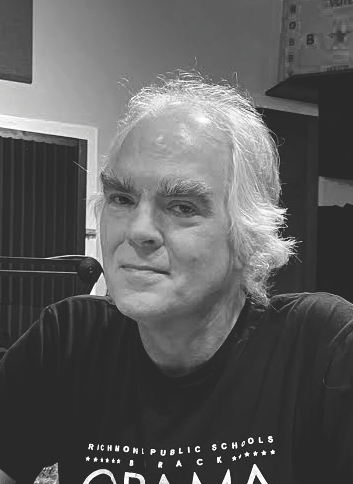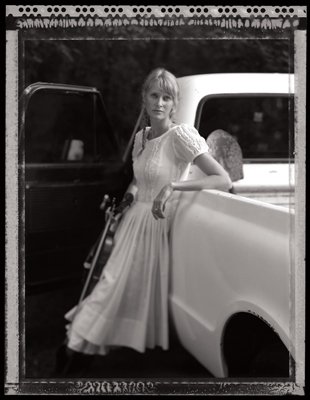Maggie Ingram is one the best gospel singers in America—and one of Virginia’s best-kept secrets. An ordained minister with a commanding stage (and church) presence, she cares as much about the message as the music. It’s time to testify.

Singing Ain’t Enough
Maggie Ingram
Even the late James Brown knew what a force of nature Maggie Ingram was. After catching their act in Georgia years ago, the Godfather of Soul offered Richmond’s First Lady of Gospel Music and her family band a spot on his tour. “We don’t sing rock ’n’ roll,” the 77-year-old ordained minister remembers telling him. “That’s the way I raised my children. I raised them in the church, so they just never got hung up in rock ’n’ roll at all.”
Brown probably recognized a great bandleader and frontperson when he saw one. Onstage, “Mama” Maggie Ingram can lead her rhythmic nine-piece Ingramettes with a nod or an arched eyebrow, tossing off down-home monologues one minute, leading extended call-and-responses for Jesus the next. Then, time will stop, and with her faith hanging on every note, the tall, regal lady with the chiseled profile will deliver a vocal testimony that creates shivers in saved and sinner alike.
Her group keeps up an active performance schedule of mostly regional church programs, a community focus that has made them one of Virginia’s best-kept secrets. Ingram doesn’t mind being a somewhat obscure talent, because success has never been a priority. “Most of our songs have a message,” she says. “We’re going to leave a message with you.”
Mama recently received a Lifetime Achievement award from the Gospel Music Workshop of America, but this music is still a family affair. Her keyboardist son Lucious leads the Ingramettes’ tight and intuitive band, and daughter Almeta Ingram Miller choreographs a shimmying trio of background singers (including granddaughter Cheryl Maroney-Beaver), while acting as onstage foil to her mother. “I’m 55,” Almeta Miller says. “I’ve been singing with the band for 50 years. When other little children were outside playing marbles, we were inside in a circle with her beating a stick, keeping time. She taught each one of us our voices. She taught me soprano, my sister [Christine] alto, the boys [Lucious, Tommy] tenor, and even my oldest brother [John] sang bass. This woman, who was never formally trained in music, can play in every key of the piano. It still amazes me … she wrote almost all of our music.”
I ask Maggie Ingram where it comes from.
“It comes from God, baby.”
She was born Maggie Lee Dixon in Coffee County, Georgia, on Independence Day, 1930, one of six children to Reason and Pauline Dixon. No one else in the family was musically inclined, but she taught herself piano and traces many of her melodies to early days in the fields. “Sharecropping, working in the fields for the Mullholland plantation, you have to sing or do nothing. You feel like the world is coming to an end. So I was given the gift to sing. I got grown, I got married, I had children … but the song comes from working in the cornfields.”
She married plantation worker Thomas Ingram at 16. They had five children before moving to Florida, where her music took flight. She not only began training her young children’s voices, she sang with a Miami group called the Six Trumpets. It was while touring with them that she first passed through Richmond, met the Silver Star Quartet and sang on that group’s popular WRVA radio show.
When Thomas left the family, Maggie decided, impulsively, to move to Richmond. She says she was called by the Lord. “I made up my mind to bring the children to Richmond because of what I saw there,” she remembers. “It was the way the people sang, the way they worked together, and the way they had found favor in me and my singing.”
She soon found a place of worship—The Church of God in Christ. “It had a sound. It’s the pillar and ground of the truth,” she says. She also found an employer and benefactor—civil rights lawyer Oliver Hill. “I only had to make biscuits for him one time,” she laughs about her days as Hill’s part-time housekeeper. “Once we got to know them, they got to know us, this hard work I was doing, and he just took me from all of it … . These kids didn’t want for anything because of him.”
The Ingramettes’ 1961 debut in Richmond was at the Hood Temple AME Zion Church. One of the trustees, Joe Williams of the Harmonizing Four, offered them an opening spot for Shirley Caesar at the Mosque. A few nights later, Ingram lined her five children up on the stage of the opulent venue (now the Landmark Theater), sat down at the piano and brought the house down. In no time, they were singing with Clara Ward, the Swan Silvertones and other established acts in New York City, and recording for Nashville’s Nashboro Records. The Ingramettes’ Nashboro songs—otherworldly, stark, primal—became touchstone recordings for a generation of gospel fans. The ethereal “Melody of Love” is almost an avant-garde tone poem; “Time Is Winding Up” beseeched communists to find Jesus. A unique voice in gospel had emerged.
When sons Lucious and Tommy took up instruments in the late ’60s, the Ingramettes became a full-fledged electric gospel unit, which it has remained ever since (even as some of her children have left the group over the years). The change allowed Mama to more freely preach and testify onstage, and spurred some of her epic songs in the years to come, including “Richmond Virginia Flood.” In the late ’70s, they signed with Atlanta’s AIR label and released a series of popular albums, including The Miami Riot and Do You See What I See.
But “singing ain’t enough,” she says. “You’ve got to put something else in it.” Around Richmond, Ingram is known as the woman in the red van who delivered free food to the Mosby Court projects. It is thanks to her efforts that there are “Family Day” events in Virginia correctional centers. “They’re my babies,” she says. “I’ve become attached to them because I see that they really need to know God.”
The band’s appearances before thousands at the National Folk Festival in Richmond this past October were revelatory hometown events. Two weeks later, the group played in a Mechanicsville nursing home for 40 residents. “She wanted us to give just as much for them as for the folk festival,” Almeta Miller says. Even though the matriarch does more sitting than standing these days, she still commands attention onstage, with a feisty, funny manner (“Don’t cosign with anyone from your church. Don’t do it!”) that once had promoters begging to market her as a comedienne.
Asked about today’s professional gospel circuit, she responds, “It’s all about money now. “Priorities have changed.” Maggie Ingram has never been tempted to make her songs more commercial, like many contemporary gospel performers. “That’s them, not me,” she says quietly. “Being a Christian woman, I’m not trying to smear my religion around, but that’s what’s in my heart. It’s the soul in me, to carry on with what God gave me.”
-Originally published February 2008








